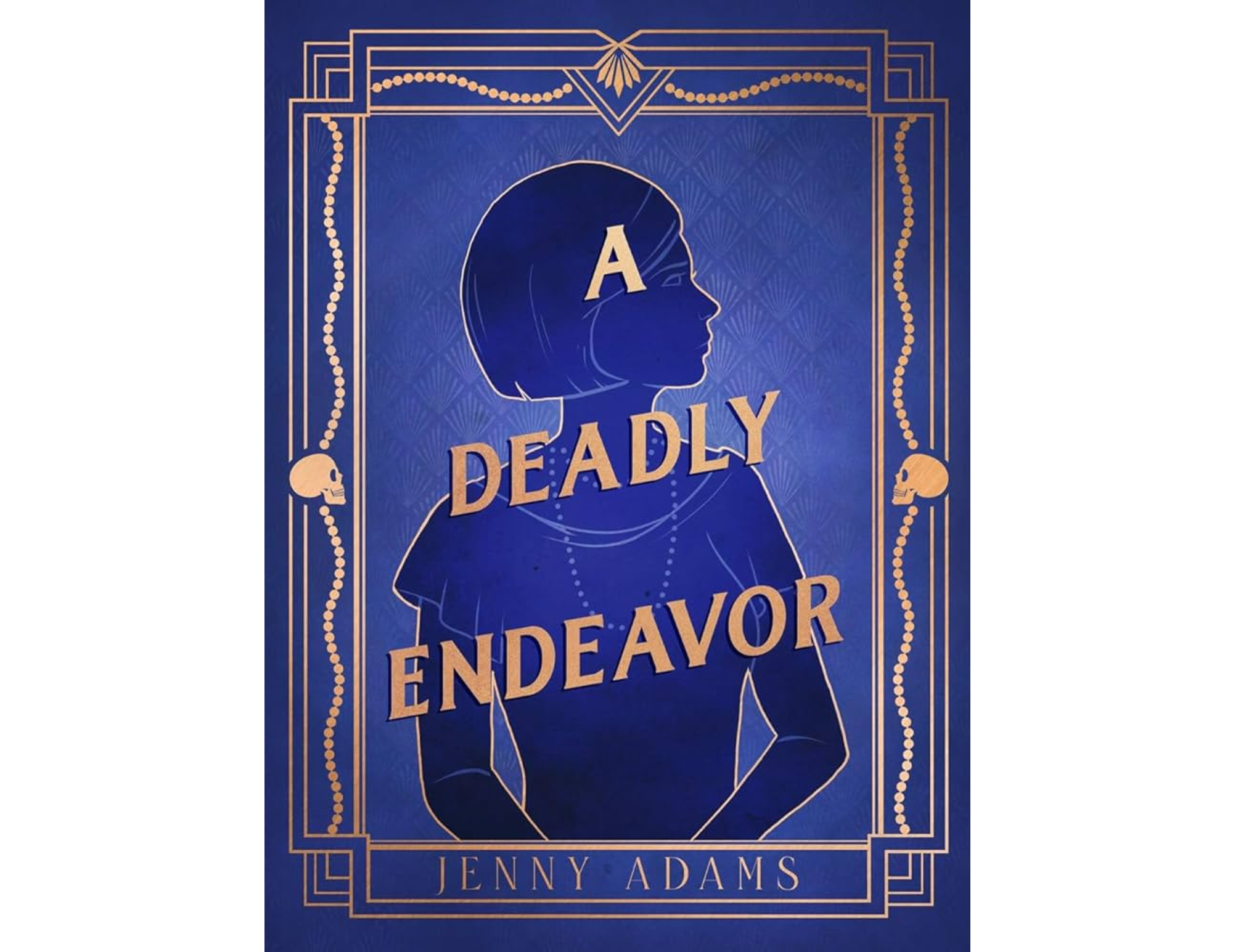Jenny Adams hooks you fast and doesn’t let go with A Deadly Endeavor, her electrifying historical mystery set in Prohibition Philadelphia.
The first World War is over and there’s no returning to normal after the Pandemic of 1918. Back in Philly for the first time in years, high-society lady Edie Shippen hides her tumultuous emotions and debilitating migraines behind a snarky smile and a flippant attitude. But when women connected to the Shippen household begin to disappear and mutilated bodies are found on the banks of the Schuylkill River, Edie will have to team up with city coroner Gilbert Lawless to catch the killer.
These two main characters, Edie and Gilbert, are refreshingly flawed without coming across as contrived or stereotypical.
Throughout the course of the book, Edie slowly recognizes her privilege as the daughter of one of the most powerful men in Philadelphia. An influenza survivor, she begins the story as a bit of a spoiled brat who you want to dislike, but her tender heart and fiery personality are frustratingly charming. Edie is jealous of her twin sister, Frances, who is engaged to Edie’s childhood sweetheart, Theo. She has conflicting feelings of anger and shame about their relationship but hides these emotions from them. On top of this, she feels trapped by the role her family has assigned her, lamenting how high society ladies are “destined for ballrooms and charity lunches, and a slow, graceful decline into the invisibility of motherhood and middle age.”
Suspicious of Edie’s sour mood, her cousin, Rebecca, encourages her to attend a meeting of an all-female art club. This club opens Edie’s eyes to the possibility of being a woman with artistic ambition and educated, even controversial opinions. It also inspires Edie to consider how she benefits from, and contributes to, the class disparities that prop up the Shippen household. She recognizes that her maid, Lizzy, is more than just a servant; she’s a young woman just like Edie with dreams and complex, even contradictory emotions.
As a reader in the 21st Century, you can’t help but roll your eyes at this realization Edie finds so groundbreaking. But you also can’t help but sympathize with Edie and her isolation as the women in the club begin to disappear and the people she trusts are cut out of her life, forever. When Lizzy disappears, too, Edie is faced with the hard truth that she’s not the independent, modern woman she thought, and she can’t solve the mystery alone.
Before he reluctantly teams up with Edie, Gilbert does everything he can to stay under the radar. Though he has medical training and experience from his time in France during WW1, he’s convinced that he can never be a practicing doctor because he suffers from PTSD. In the 1920s, this condition is referred to by some as “shell shock” and by others as “cowardice.” Instead of working with live patients, Gilbert commits himself to autopsying the dead for the Philadelphia Police.
When young women start turning up dead by the river, Gilbert is one of the first people on the scene. He’s disturbed by the grotesque conditions of the victims’ bodies and wants to help identify them, but the police push him out of the investigation. However, when Lizzy goes missing, along with several high-society woman, sitting on the sidelines will no longer be an option.
Conducting his own investigation into the murders throws Gilbert into cahoots with Edie, who he dislikes on principle. Edie steamrolls through conversations with Gilbert about her exorbitant spending habits, justifying her shopping with the excuse that “it’s just money,” and dismissing the implications of Lizzy’s servitude to her. “There’s nothing wrong with earning an honest living.” Gilbert remains loyal throughout the story to his criticisms of Edie’s naivety. But he recognizes that Edie harbors a genuine sadness about the condition of her family and how it forces people into a box, and can’t help but appreciate her for that.
Though she’s warned that it’s inappropriate to associate with Gilbert, Edie pretends to date him as a cover for her frequent quests into the city. Both the characters insist that they don’t need the other to solve the mystery, but Gilbert lacks Edie’s resources and charm, and Edie lacks Gilbert’s connections and street-smarts. With their powers combined, Edie and Gilbert form a detective. Their sleuthing takes them through the gilded halls of beautiful apartments, along the Schuylkill in the early morning, and into the smoky guts of Prohibition speakeasies. No one can be trusted, and the killer can be anywhere. To their shared dismay, the only way to solve the mystery will be to set aside their differences and confront their skeletons.
The Philadelphia of the roaring twenties has more in common with ours than one might initially suspect. Adams’ characters struggle with many of the same issues we face today. They put on acts of confidence and strength, but suffer from misogyny, PTSD, ethnic discrimination, and their own lack of self-esteem. Framed through the lens of 1920s conservatism, the timelessness of these issues is revealed, inviting the reader to consider the context in which they emerged and the responsibility we have to address them today.
With masterful charm and unfiltered grit, Adams has crafted a story that is simultaneously a love letter to Philadelphia and a classic twister of mystery, friendship, and murder most foul.
Learn more about A Deadly Endeavor and purchase a copy here.
A Deadly Endeavor
Jenny Adams
Crooked Lane Books
March 4th, 2024
351 pages

